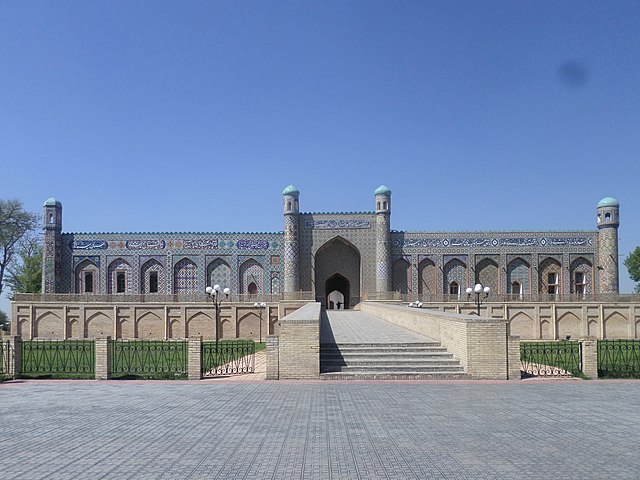Hamza Hakimzade Niyazi was an Uzbek author, composer, playwright, poet, scholar, teacher, and political activist. Niyazi is widely seen as one of the leading figures in the early development of modern Uzbek literary tradition. He is generally considered the first Uzbek playwright, the founder of modern Uzbek musical forms, as well as the founder of Uzbek social realism. During the Russian Revolution, he strongly supported the Bolsheviks, as they strongly opposed the system of feudal rule that was prevalent in much of Central Asia. He was one of the first Uzbeks to join the Communist Party and dedicated his life to promoting literacy and education in his homeland, opening schools and orphanages.
Hamza Hakimzade Niyazi in the 1920s
Niyazi in 1906
Niyazi's mausoleum in Shohimardon
Niyazi on a 1989 Soviet commemorative coin
Kokand is a city in Fergana Region in eastern Uzbekistan, at the southwestern edge of the Fergana Valley. Administratively, Kokand is a district-level city, that includes the urban-type settlement Muqimiy. The population of Kokand as of 2022 was approximately 259,700. The city lies 228 km (142 mi) southeast of Tashkent, 115 km (71 mi) west of Andijan, and 88 km (55 mi) west of Fergana. It is nicknamed "City of Winds". In 1877 when the first ethnographic works were done under the new imperial Russian administration, Khoqand/Kokand was reported and visually depicted on their maps as Tajik inhabited oasis (C.E de Ujfalvy. The city and the entire eastern 3/4 of the Fergana Valley were included in Uzbekistan in the 1920s and Stalin's dictates of political borders.
Image: Khudayar Khan Palace, Kokand 01
Image: Kokand Teahouse (495833)
Image: Amin Beg Madrassah, Kokand (495828)
Image: Church 01 01








